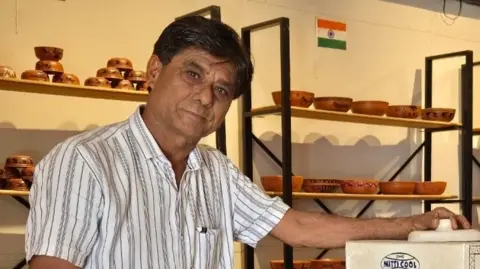In the landscape of innovative entrepreneurship, frugal tech has emerged as a powerful concept that provides affordable solutions to pressing challenges, particularly in developing regions. This article highlights the remarkable journeys of various entrepreneurs, such as Mansukh Prajapati and Bijayshanti Tongbram, who exemplify this spirit of frugality in their innovative approaches.
Mansukh Prajapati’s story begins in Morbi, a vibrant city in western India, where he grew up watching his father work tirelessly as a potter. Childhood for Prajapati involved waking up before dawn to walk six miles each day to collect clay for producing pottery, which was used predominantly for storing water. However, while clay pots were commonplace in Indian households during the 1970s, the income generated from this trade was minimal and accompanied by societal stigma. Prajapati recalls the unwelcoming perceptions surrounding potters, as many families were reluctant to marry off their daughters into pottery families due to the labor-intensive nature of the trade.
His life took a significant turn with the devastating earthquake that struck Gujarat in 2001, which destroyed his family home and rendered his pottery business in ruins. Amidst devastation, a local news story likened the clay pots to refrigerators, describing them as “the poor people’s fridge.” Inspired by this idea, Prajapati embarked on a mission to invent a refrigerator that functioned without electricity, using clay as the primary material.
Despite lacking formal training and facing immense financial challenges—including $22,000 in loans—Prajapati persevered through years of experimentation. In time, he developed the MittiCool, an innovative clay fridge that cools its contents through evaporation, keeping fruits and vegetables fresh for days. Priced at $95, the MittiCool is now available in 300 stores across India and has expanded to international markets such as the UK, Kenya, and the UAE. Prajapati’s invention not only provides access to cooling solutions for impoverished families but has also created about 150 jobs in his workshop, potentially changing the local economy.
Similarly, Bijayshanti Tongbram, a botanist based in Manipur, has developed a unique business model centered around sustainability. Living in Thanga village, located by Loktak, one of India’s largest freshwater lakes, Tongbram observed that while lotus flowers were widely used for religious offerings, their stems often went to waste. Capitalizing on this, she created a process to extract silk-like fibers from the lotus stems, which are then spun into yarn to produce one-of-a-kind scarves and garments.
By training and employing 30 women from her village, Tongbram has not only provided them with an opportunity to earn a living but also shifted traditional gender roles in the community, allowing women to engage in activities beyond fishing. However, like many small business ventures, she faces challenges in expanding her market reach, underscoring the pressing issue of accessing funding, particularly for rural entrepreneurs.
Despite various government initiatives, navigating the landscape of financial support can be daunting for grassroots innovators. Profound yet limited access to funding for ventures like those of Prajapati and Tongbram hinders further technological advancements. Prof. Anil Gupta from the Honeybee Network, which supports grassroots innovations, notes that many entrepreneurs lack awareness of the funding resources available to them.
Yet, the momentum behind frugal innovations in India persists, fueling entrepreneurial spirit. In Karnataka, for instance, Girish Badragond is developing a smart farming stick designed to assist blind and partially sighted farmers in navigating agricultural challenges, thereby fostering independence and empowerment in an often marginalized demographic.
In summary, the examples of Mansukh Prajapati and Bijayshanti Tongbram vividly illustrate the potential inherent in frugal technology. As these innovators tackle real-world problems with limited resources, they pave the way for economic transformation and empowerment within their communities. Their stories underscore essential lessons in resilience, creativity, and the invaluable impact of entrepreneurship aimed at societal betterment. The advancements made by such grassroots entrepreneurs highlight the importance of supporting their journeys to facilitate broader access to affordable solutions, ultimately enabling dreams to become tangible realities in underserved communities.



